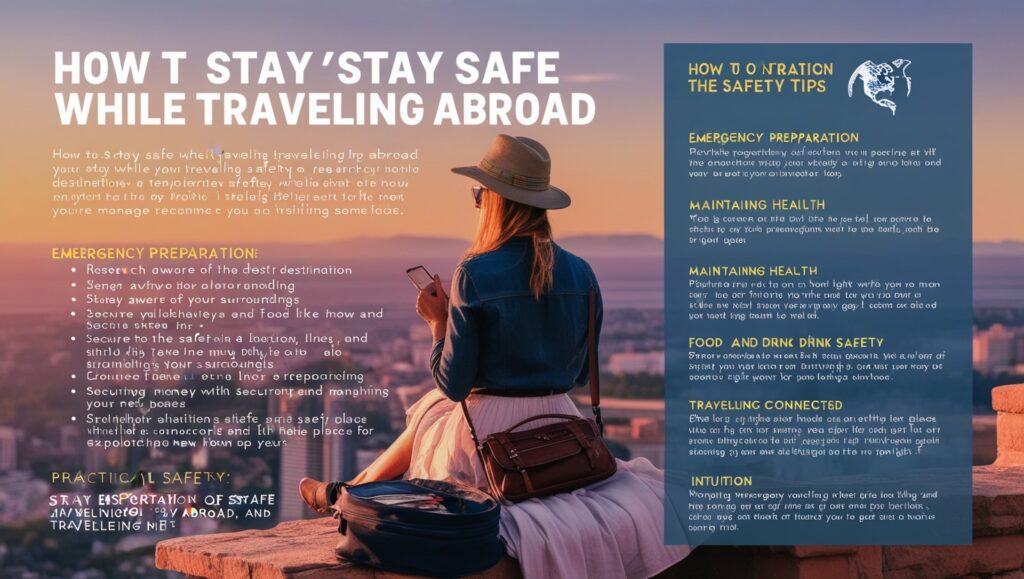How to Stay Safe While Traveling Abroad
Traveling abroad can be an exhilarating experience, filled with opportunities to explore new cultures, cuisines, and landscapes. However, it also comes with its own set of challenges and risks. Whether you’re an experienced traveler or embarking on your first international journey, safety should always be a priority. Here’s a comprehensive guide on how to stay safe while traveling abroad.
1. Research Your Destination Thoroughly
Understanding your destination before you arrive can significantly enhance your safety. This includes learning about:
- Local Customs and Laws: Every country has its own set of cultural norms and legal expectations. Familiarize yourself with these to avoid unintentional offenses. For example, in some places, certain clothing or behaviors may be deemed inappropriate or even illegal.
- Travel Advisories: Check government websites for any travel warnings or advisories about your destination. This information can help you make informed decisions and stay aware of potential risks.
- Weather Conditions: Know what kind of weather to expect so you can pack appropriately and avoid being caught unprepared by extreme conditions.
2. Stay Aware of Your Surroundings
Maintaining situational awareness is one of the most effective ways to stay safe:
- Blend In: Avoid standing out as an obvious tourist. Dress in a way that aligns with local customs, and be discreet with maps or guidebooks.
- Be Cautious with Personal Information: Do not share your travel plans or personal details with strangers. Keep your travel documents secure and only share your itinerary with trusted individuals.
3. Keep Your Valuables Secure
Pickpocketing and petty theft are common in many tourist-heavy areas. Here’s how to protect your belongings:
- Use Anti-Theft Bags: Invest in bags with anti-theft features such as lockable zippers and slash-resistant straps.
- Wear a Money Belt: Keep important items like your passport, cash, and credit cards in a money belt under your clothes.
- Limit What You Carry: Bring only the essentials when heading out for the day. Leave expensive jewelry and unnecessary valuables in a secure place, like a hotel safe.
4. Be Prepared with Emergency Information
In case of an emergency, knowing who to contact can make all the difference:
- Keep a List of Emergency Contacts: Have a physical list of important phone numbers, such as the local police, emergency services, and your country’s embassy or consulate.
- Share Your Itinerary: Let close friends or family members know where you’ll be and how to reach you.
- Know the Location of Medical Facilities: Identify nearby hospitals or clinics that cater to travelers.
5. Stay Connected
Having access to communication channels is crucial while traveling abroad:
- Local SIM Card or Roaming Plan: Consider purchasing a local SIM card for affordable data and calls, or set up an international roaming plan.
- Wi-Fi Security: Use secure Wi-Fi connections and avoid accessing sensitive information over public Wi-Fi. Utilize a VPN for an added layer of security
6. Protect Your Health
Staying healthy while abroad is part of staying safe:
- Vaccinations: Ensure you are up-to-date on vaccinations required or recommended for your destination.
- Pack a First Aid Kit: Bring essentials such as band-aids, antiseptic wipes, pain relievers, and any personal medications.
- Drink Safely: Be cautious about drinking tap water in places where it may not be safe. Opt for bottled or filtered water and avoid ice if you are unsure of its source.
7. Be Cautious with Food and Drink
Experiencing local cuisine is one of the joys of traveling, but food safety should be considered:
- Eat at Reputable Establishments: Choose restaurants that have good reviews and a steady flow of customers.
- Be Wary of Street Food: While street food can be delicious, ensure it’s prepared hygienically and served hot.
- Watch Your Drink: Always keep an eye on your drinks to avoid the risk of them being tampered with.
8. Practice Smart Money Management
Managing your money wisely helps reduce the risk of theft and ensures you are financially prepared:
- Use Credit Cards Wisely: Pay with credit cards for purchases when possible, as they often come with fraud protection. Keep your credit card in sight when making transactions.
- Carry Cash in Multiple Places: Split your cash between different locations, such as your wallet, money belt, and hotel safe.
- Notify Your Bank: Let your bank know about your travel plans to avoid your cards being flagged for suspicious activity.
9. Stay Safe at Night
Nighttime travel presents its own challenges:
- Travel in Groups: Whenever possible, travel with others and avoid isolated areas.
- Use Trusted Transport Services: Opt for licensed taxis or reputable ride-sharing services. Be wary of accepting rides from unmarked vehicles or strangers.
- Stay in Well-Lit Areas: Stick to well-populated and well-lit streets
10. Trust Your Instincts
Sometimes the best safety tool you have is your intuition:
- Listen to Your Gut: If something feels off, trust your instincts and remove yourself from the situation.
- Be Polite but Firm: If approached by someone who makes you feel uncomfortable, respond firmly but politely and walk away.
Final Thoughts
Traveling abroad can be one of life’s most rewarding experiences, but staying safe should always be a top priority. By researching your destination, staying aware of your surroundings, securing your valuables, and practicing good health and money management, you can greatly reduce potential risks. Follow these guidelines and embark on your adventure confidently, knowing you’re prepared to handle challenges while focusing on the joys of travel.

